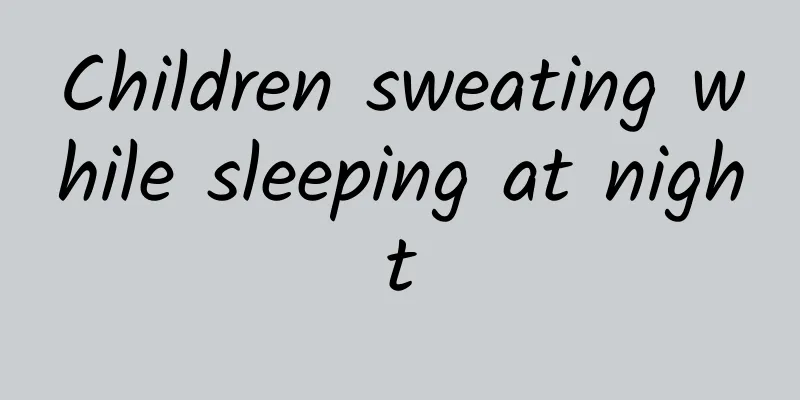Children sweating while sleeping at night

|
Because children are young, most of them sleep with their parents when they are young. When children sleep with their parents, parents can effectively observe any abnormal physical symptoms that occur in their children at night. Some parents have found that their children always sweat when they sleep at night. At this time, it is necessary to understand why children sweat all the time when they sleep at night. 1. What is the reason for the baby to keep sweating when sleeping at night? It is common for babies to sweat during sleep, and it is not always a symptom of weakness or illness. Many parents believe that their children’s constant sweating is due to their weak constitution. In fact, a considerable number of children suffer from physiological hyperhidrosis. Physiological hyperhidrosis is more common in the head and neck, often occurring within half an hour after falling asleep, and sweating stops in about an hour. Infants and young children have an active metabolism and are active and lively. Some of them cannot rest even after going to bed at night, so they may sweat on their heads after falling asleep. The so-called physiological hyperhidrosis refers to sweating during sleep when the child is well-developed, healthy, and has no disease. Parents are often accustomed to deciding the best environmental temperature for their children based on their own subjective feelings, and like to cover their babies with more blankets and keep them tightly covered. Because children's brain and nervous system are not yet fully developed and they are in the growth and development period, their body metabolism is very active. Coupled with the stimulation of overheating, they can only regulate normal body temperature by sweating to evaporate the heat in the body. Some active children exercise a lot during the day and generate a lot of heat. The body is unable to dissipate the excess heat through sweating, so the heat accumulates in the baby's body, and the baby's body temperature can reach around 38°C at night. After the baby falls asleep, the heat generated decreases, the sensitivity of the sympathetic nerves decreases, and the body dissipates excess heat through sweating to maintain normal body temperature. In addition, drinking milk, malted milk or eating chocolate before going to bed can also cause sweating in children. Some parents give their children milk, malted milk, etc. before they go to sleep. After the child falls asleep, the body produces a large amount of heat, which is mainly dissipated through sweating through the skin. In addition, too high room temperature or excessive warmth can also cause children to sweat while sleeping, which are all physiological sweating. 2. The difference between physiological sweating and pathological sweating in babies Physiological sweating Babies grow and develop quickly, are active, the weather is hot, they wear thicker clothes, and the room temperature is high, which can easily cause them to sweat. This type of sweating is normal sweating. Pathological hyperhidrosis It is mostly caused by diseases, such as the baby suffering from active tuberculosis, diabetes, hyperthyroidism, etc. When a baby sweats excessively in a certain part of his body or all over the body without exercising, it is called "sweat syndrome". Spontaneous sweating and night sweats are common in babies, which are mostly caused by improper feeding or indigestion. Here are some diseases and other conditions that can cause your baby to sweat excessively: 1. Active rickets: Infants and young children under 1 year old who do not often bask in the sun and rarely consume cod liver oil, calcium powder, etc., if they sweat excessively and cry and become irritable at night, they are likely to suffer from active rickets. 2. Active tuberculosis in children: If children sweat a lot in the first half of the night and before dawn, it is considered "night sweats". At the same time, the patient also has poor appetite, low fever in the afternoon, flushed face, and weight loss, sometimes accompanied by cough, enlarged spleen and liver, and swollen lymph nodes. If the elderly, parents, etc. in the family have a history of this disease, the baby is prone to this disease. 3. Hypoglycemia: often refusing to eat dinner, being uninterested in the morning, having a bad mood, pale face, prone to cold sweats, etc.; 4. Pediatric endocrine diseases: manifested as irritability, panic, palpitations, and even bulging eyes. |
<<: Why do I have a headache when I catch a cold?
>>: A five-year-old child sweats while sleeping
Recommend
What causes dizziness?
Vertigo only occurs in very few people, but becau...
Are blood viscosity and high blood lipids the same thing?
Blood viscosity and high blood lipids are not the...
Cardiac neurosis
In daily life, we often hear about mentally ill p...
Cantonese method of making soup with raw and cooked rehmannia root
Raw and cooked rehmannia are different types of C...
What does esophageal reflux look like? Symptoms of esophageal reflux
Esophageal reflux is also known as gastroesophage...
What are the common symptoms of acute pharyngitis?
Pharyngitis is a relatively common throat disease...
How to treat white mouth sores, try this method
The treatment of white mouth sores needs to be ta...
There are several ways to perform colonoscopy
Intestinal problems never follow the routine. Eve...
Typical manifestations of phlegm-dampness blocking the middle part of the body
Phlegm-dampness blocking the middle of the body s...
Cold and dampness Chinese patent medicine
Cold and dampness is an unhealthy physical condit...
High lymphocyte count
There are lymphatic organs in many parts of the h...
Common causes of peripheral nerve dysfunction
Peripheral nerve dysfunction is also quite common...
What to do if vocal cord development is delayed
There are many reasons for delayed vocal cord dev...
Is the triple positive contagious?
Hepatitis B is a relatively common disease in lif...
Can melon and apricot be eaten together?
Muskmelon, also known as cantaloupe, is a fruit w...









